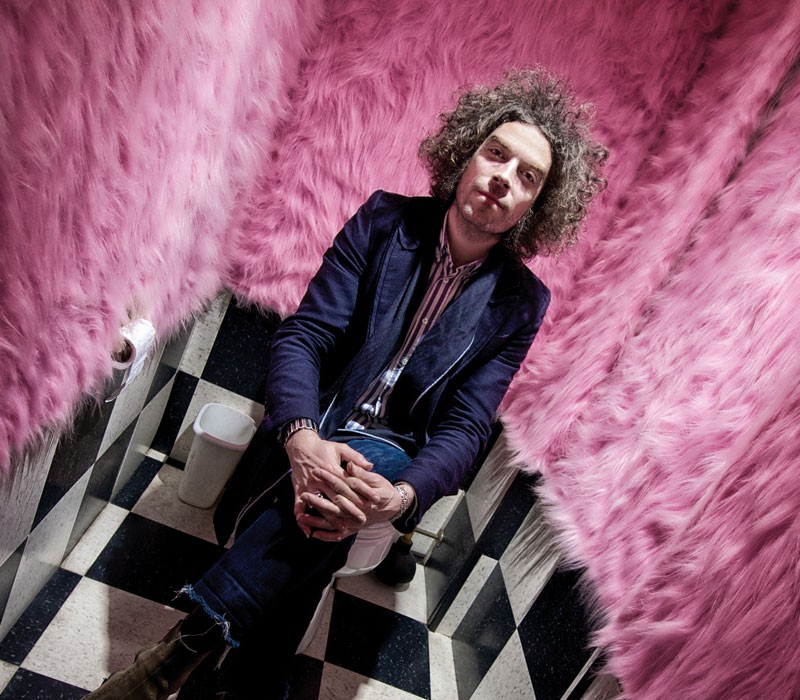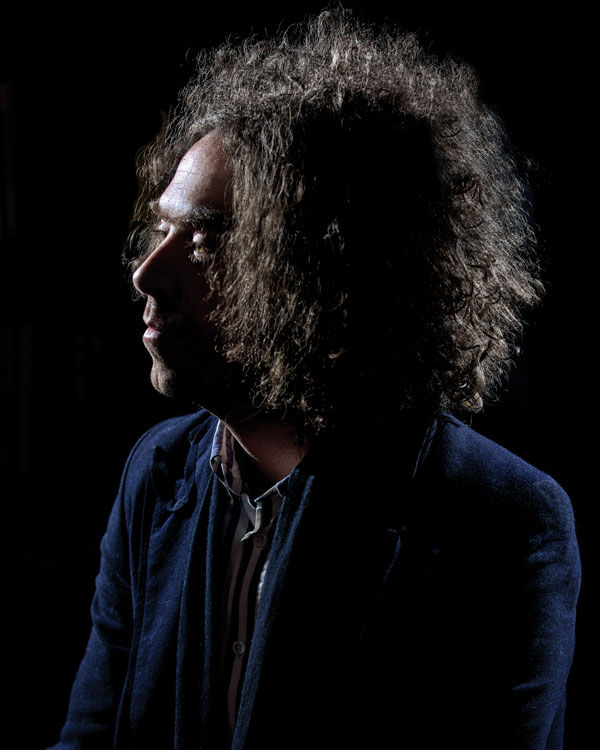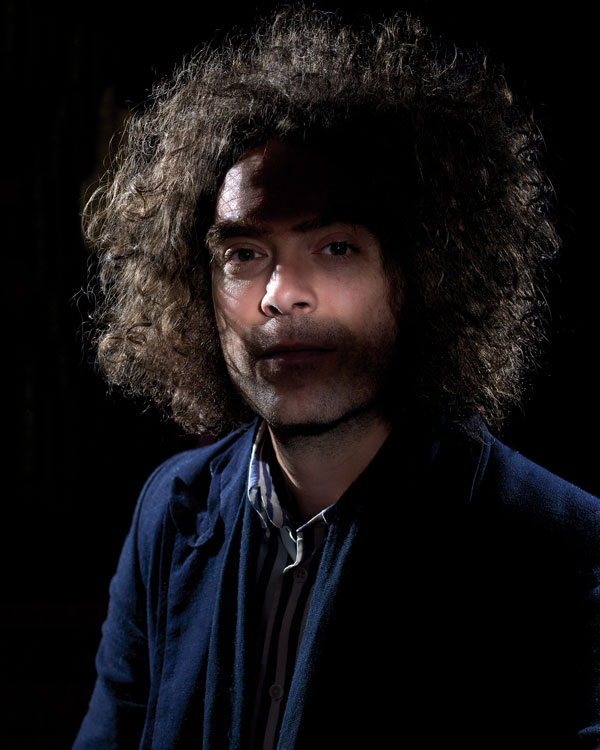By Jef Krohn
Photos by Miri Stebivka
If there’s one thing that can definitively be said about Brent DeBoer—drummer for the Dandy Warhols and front man of Immigrant Union—it’s that he truly is the epitome of a vintage-style rock star. DeBoer showed up to our interview directly from the late 1960s, complete with a velvet blazer, well-worn second-hand jeans, and light brown suede boots that look like they fell off a wagon during an episode of Little House on the Prairie. The only thing that takes attention away from his wild afro-style hairdo is the charismatic grin that seems to take over every one of his expressions.
After a brief introduction, DeBoer took a minute to show me around the Odditorium, the Dandy’s private office/recording-studio/party-palace and the setting for our interview. He started opening doors, nonchalantly introducing one eclectic room after the next, and it become apparent that his calm, cool demeanor belies his eccentric and seemingly extravagant lifestyle.
From the “Organ Lounge” (an orange velvet-walled room filled with antique organs, candles, lace curtains, and a bar) to the state-of the art modern styled recording studio, to the well stocked commercial-grade rustic gourmet kitchen, to the gigantic high-school gymnasium-style practice space (complete with stage, lounge, sound system, and dance floor), the Odditorium is clearly a musicians dream of a playhouse. As DeBoer explains, “Yeah, it has a little bit of everything in here…but the one thing that we made sure not to have in here is a shower or beds. So everybody actually has to go home. Otherwise it would be really hard to get out of here.” We finally made it to the dining room and took up camp at one corner of a table that looked like it could feed forty-four of DeBoer’s closest friends and family. I switched the recorder on and started at the beginning.
DeBoer, as I found out, tends to downplay everything about himself. In fact, he refuses to take credit for his talent or his success, insisting that he doesn’t even remember getting good at the drums. “I got [my first] drum set when I was about five,” Brent says. “[As a child], I kind of use to rock on the bed and a like lightly bump my head on the headboard just listening to the bum…bum [of the music], you know. I think it was my mom who asked a doctor about it, and he said that it was fine, but I just liked music so he kind of suggested it [getting me drums].” When I asked if he’d had lessons, DeBoer was pretty clear that he was self taught. “Courtney taught me a few tricks. He was my cousin and he would come around every once in a while… [But growing up], I didn’t really play the drums much.”
Apparently, his interest in a music career was yet to be realized. DeBoer recalls, “I remember looking out my window and Rick [Bain] comes pulling into my cul-de-sac, and I saw him back his old Datsun station wagon into my driveway.” He gives a slight chuckle. “I watched him get out and go to the back of it and flip up the hatch, like, before he even came to the door or anything. Then as soon as I opened the door, he was like. ‘Where are the drums? Where are the drums?’ They weren’t really set up, but he just immediately started loading them right out the door, into his car. Basically he kidnapped me and took me to his place—and that’s when I really started playing.”
At that point, in 1992, DeBoer was around 17 years old, had just been kicked out of his high-school marching band, and was spending all his early evenings after school just sitting around at home. Bain’s old drummer had just graduated, so he needed a new one. Catching wind of DeBoer’s newfound boredom, Bain kidnapped him, and whammo—fate took over from there. Between 1993 and 1997, DeBoer and Bain started and dismantled a string of bands, from Spoon, to IOU, to Spin Jupiter Spin… They continued to evolve together, and Bain would go on to create what would later become the Genius Position (See PDX Mag’s December issue, “The Comeback of Rick Bain and the Genius Position”).
Meanwhile, the Dandys were catapulted to semi-national recognition with their cosmic-surf-style, psychedelic/shoe-glam rock sound, and in 1998 they’d signed a five-album deal with Capitol Records. Just as the Dandys were set to launch their first international tour on Capitol’s dime, Eric Hedford, the band’s original drummer, left over what was rumored to be a royalties dispute.
It was right about that time that DeBoer and Bain were starting to gain some serious local recognition… And that’s when DeBoer got a call from his cousin, Courtney Taylor-Taylor. The Dandy Warhols’ front man invited him to join the band and replace the drummer, and without hesitation DeBoer accepted.
With a whisper of disbelief, DeBoer recalls those first few days. “A week before [the Dandys’] first European tour, Eric, their previous drummer, just quit. [So Courtney called me] and I came in. We had just a couple of rehearsals… Then we flew off on tour.” He continues, “Basically, the fourth or fifth time I ever played any of their songs at all was in front of a sold-out show… It was kind of an out-of-the-body experience and it was interesting—you know, for the first few weeks, I didn’t know these people.”
In 2000, the Dandys released Thirteen Tales from Urban Bohemia. The album went largely unnoticed until an English cell phone company, Vodaphone, used the track “Bohemian Like You” in a commercial during the half-time of the World Cup semi-finals match against Brazil in 2002.
“People heard [‘Bohemian Like You’] and really liked it, and started calling radio stations and saying, ‘Is that a new song?’, ‘Is it an old song?’, ‘What is this?’” Brent recalls. “So radio, little by little, just started playing it… If it wasn’t for Vodaphone doing that, there’s a real chance that I wouldn’t be sitting here talking to you right now.” Indeed, suddenly their sounds were everywhere: on commercials, television shows, video games, and in movies (most notably There’s Something About Mary and Goodwill Hunting). They topped the charts in multiple countries around Europe and Australia, and reached the number 5 spot in the U.S.
The Dandys instantly became an international Portland brand. They started playing festivals and packing auditoriums all over the world, and in so doing brought credibility and notoriety to the Portland music scene. They were even the subject of a critically acclaimed documentary called Dig!, which centered on the (falsely depicted) love-hate relationship between Anton Newcomb, front man of the Brian Jonestown Massacre, and Courtney Taylor-Taylor. As Brent tells us, “I think what Dig! did was to inaccurately portray both bands to be all these things that they’re not… It was a really great documentary, but it wasn’t entirely true, at all. I mean she [Ondi Timoner, director\writer of Dig!] took 2,400 hours of footage and narrowed it down to 2 hours—and she narrowed it down to the ickiest sides of all of the characters involved.” And with that much material, DeBoer explains, you can paint any kind of picture you want: “You could go around filming my mom, who was a fourth-grade school teacher for seven years, and with 2400 hours of footage make her into whatever you want.”
However, it was in these intense early formidable years that DeBoer really grew into his rock-n-roll persona: “Fathead,” a nickname given to him by Taylor-Taylor. DeBoer recalls, laughing, “Yeah, Courtney started calling me that because of my giant hair. It was kinda always in the way and he couldn’t see through it, so he’d say, ‘Move your fat head!’” Watching Fathead play, you’ll see that he has really embraced a unique style of performance. Unlike the traditional rear-center location for the drummer, his kit is usually directly stage-left, and as close to the fans as possible. It’s almost as if you’re on the stage with him, and as a spectator, you feel a sense of ownership in what he’s doing. He gives the impression, at least, that he’s not the singer or the star, he’s one of the fans, just playing along and enjoying the show.
Clearly, fame hasn’t impacted DeBoer as you sometimes see in other mainstream artists; DeBoer is refreshingly human—a trait I would like to consider uniquely Portlandish. When I asked him how he’s been able to maintain his connection to the fans, he says, “There are some things about our band that are a little different than other bands. Like, Courtney and I would finish a gig and instead of exiting through the wings to the back stage, we use to just hop off the front of the stage and head to the bar, and just sit across the place until our butts had to leave. We met a lot of cool people that way… If Robert Smith (the Cure’s lead singer) [did that], he would give fans heart attacks. I don’t know if they can do that. Our fans are a little bit less fanatical.” Of course, during the height of their fame, things were a little different. As DeBoer recalls, “During the height of ‘Bohemian Like You,’ in Europe, I wouldn’t have dared to do that… [When] you’re recognizable even to people that strongly dislike the band and dislike what they read about you, or what they heard [Taylor-Taylor] say on a TV show, then you get really drunk freakaziods yelling nasty shit at you, and that’s just no fun. But after a couple years that started to settle down, and now Courtney and I [can] head out into a festival and the only people who recognize us are fans.”
As a fan myself, I couldn’t help but to be hypnotized by DeBoer’s style and demeanor. He oozes with the kind of hip you’ll only find in Black Crows music videos or Southeast Portland—but DeBoer treats everyone with a genuine appreciation, and in no time he makes you feel like an old friend. His sincerity became very apparent during the photo shoot portion of our interview. As DeBoer and PDX Magazine photographer Miri Stebivka were reviewing some of the shots he had just taken, I heard Brent commenting, “Wow, man. How did you do that?” and “Can you send me a copy of that?” It was clear that DeBoer is as genuine and grateful as he is talented and deserving of his fame. A fame that took a slight detour about six years ago.
In 2008, Capitol Records dropped the Dandy Warhols from the label. DeBoer weighs in on the split with humility mixed with a hint of remorse: “There was a little bit of time there [earlier on], where we wished we could get off the label and [we] tried and…didn’t succeed.” At the time, the Dandys didn’t think the label was looking after them well, but DeBoer is quick to admit there was the upside to having a label. As he takes a deep breath and sits back, DeBoer tells us, “But you know, when you leave a label, you do learn what they did really well, right away. ‘Cause all these things that are going completely haywire, you realize massive companies are really good at. [We] realize right away that we’re just mainly really, really good at playing music together [and would rather just focus on that].”
Shortly after the split with Capitol, the Dandys started their own independent label, Beat the World Records, and released the album Earth to the Dandy Warhols. They also worked to release albums from other Portland artists including Logan Lynn, the Upsidedowns, the Hugs, and L.A.-based band Spindrift. It was also around this time DeBoer released his own solo album, The Farmer, recorded at the Odditorium and released in 2010. His first attempt at separating himself from the Dandys was met with mild enthusiasm. With a sound, as DeBoer explains it, “like a drum beat in a vacuum cleaner,” it seemed apparent that America just wasn’t ready to let go of Fathead and embrace DeBoer, himself. The solo album made a few more waves in Australia, where he was living at the time of its release, than it did in the States.
In 2009, DeBoer and his wife, Sarah, moved to the lovely shores of Melbourne to raise their newly started family in his wife’s hometown. It was there that he met Bob Harrow of the Lazy Sons, and the two started the band Immigrant Union. In 2012, they put out their first self-titled album, which was recorded in the Odditorium and met with mild success in Australia. An abrupt departure from anything DeBoer had done before, the Union is an Australian folk-rock band featuring DeBoer as the front man, slinging a guitar and harmonica. A perfectly balanced mix between Roy Orbison, Bob Dylan, and Pink Floyd, Immigrant Union is an eclectic mesh of classic ‘50s-style doo-wop rock, underground beatnik folk sounds of the ‘60s, and the electrically infused psychedelic sounds of the ‘70s. The good news is that Immigrant Union has since returned to the Odditorium and recorded their second album, Anyway, due for release in March of 2014.
When asked if he had any future recording planned as a solo act, DeBoer says, “Naw, not really. When I end up with a tune, I try to figure out whether or not it seems like it’s more Dandys or Union… The ones that are really more like personal and kind of icky, where I use the word ‘I’ a lot, usually I stick those with Union.
As we near the end of our conversation, I realize that if your strip away the fame, the hair, and the persona, DeBoer is just a normal down-to-earth, friendly, super cool guy. He treats everyone as his equal and has a genuine appreciation for life. He is fortunate and he knows it. Fame came easily for DeBoer, literally falling into his lap sometimes and at other times practically happening against his will. I’ve often heard that it’s all just a matter of luck, making it in this industry; but in DeBoer’s case, it seems to be the luck of the people around him that has led to his success. Or at least, that’s what he’d like us to believe.
*Most of the albums mentioned in this article are available at Music Millennium, located at 3158 E Burnside St. – (503) 231-8926




Pedro H
Cool interview